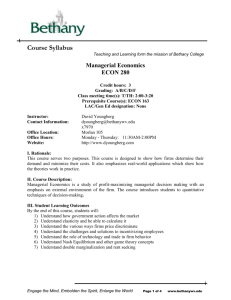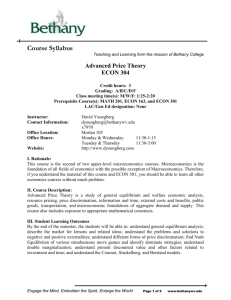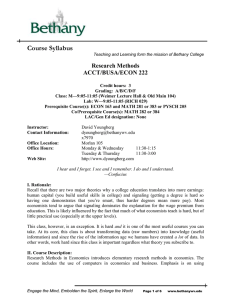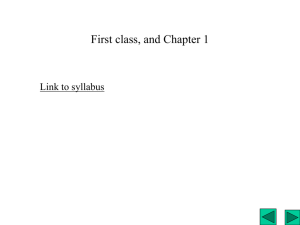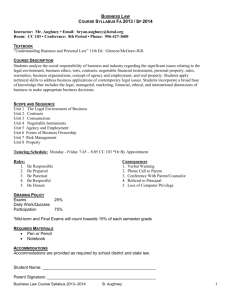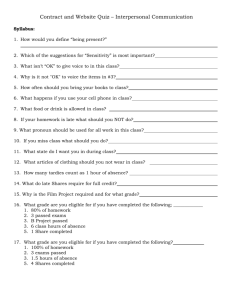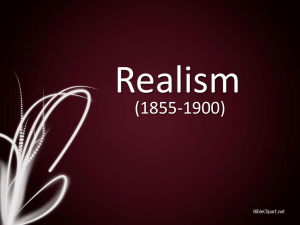Education 548: Effective College Teaching
advertisement
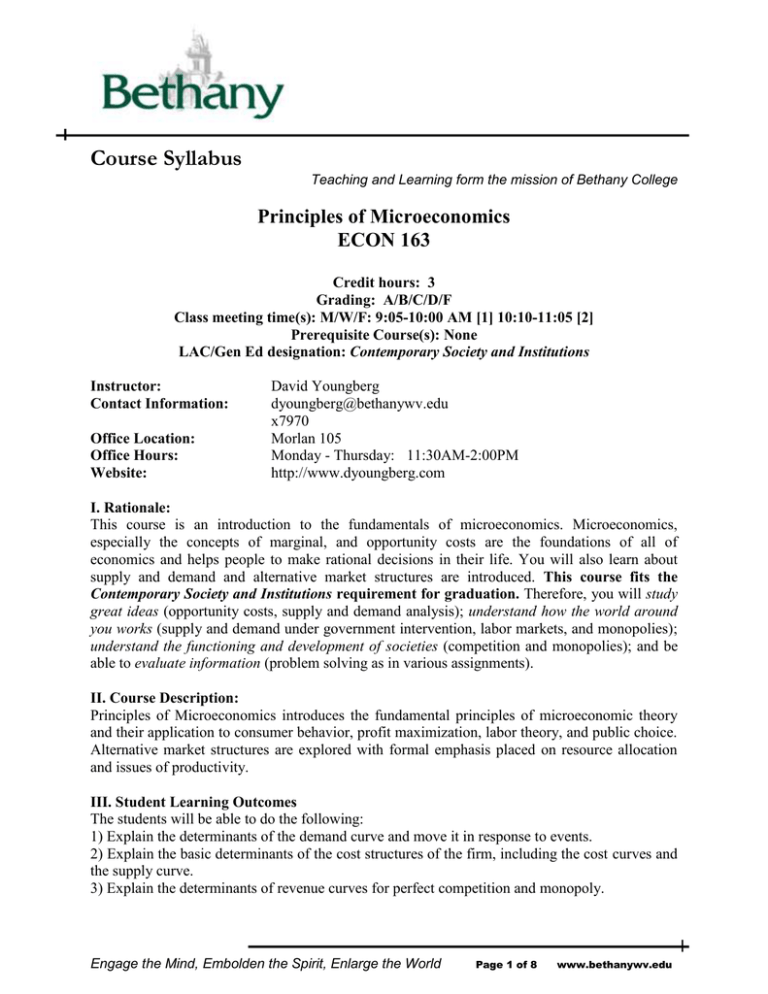
Course Syllabus Teaching and Learning form the mission of Bethany College Principles of Microeconomics ECON 163 Credit hours: 3 Grading: A/B/C/D/F Class meeting time(s): M/W/F: 9:05-10:00 AM [1] 10:10-11:05 [2] Prerequisite Course(s): None LAC/Gen Ed designation: Contemporary Society and Institutions Instructor: Contact Information: Office Location: Office Hours: Website: David Youngberg dyoungberg@bethanywv.edu x7970 Morlan 105 Monday - Thursday: 11:30AM-2:00PM http://www.dyoungberg.com I. Rationale: This course is an introduction to the fundamentals of microeconomics. Microeconomics, especially the concepts of marginal, and opportunity costs are the foundations of all of economics and helps people to make rational decisions in their life. You will also learn about supply and demand and alternative market structures are introduced. This course fits the Contemporary Society and Institutions requirement for graduation. Therefore, you will study great ideas (opportunity costs, supply and demand analysis); understand how the world around you works (supply and demand under government intervention, labor markets, and monopolies); understand the functioning and development of societies (competition and monopolies); and be able to evaluate information (problem solving as in various assignments). II. Course Description: Principles of Microeconomics introduces the fundamental principles of microeconomic theory and their application to consumer behavior, profit maximization, labor theory, and public choice. Alternative market structures are explored with formal emphasis placed on resource allocation and issues of productivity. III. Student Learning Outcomes The students will be able to do the following: 1) Explain the determinants of the demand curve and move it in response to events. 2) Explain the basic determinants of the cost structures of the firm, including the cost curves and the supply curve. 3) Explain the determinants of revenue curves for perfect competition and monopoly. Engage the Mind, Embolden the Spirit, Enlarge the World Page 1 of 8 www.bethanywv.edu Course Syllabus Teaching and Learning form the mission of Bethany College 4) Explain the basics of how profit maximization is achieved. 5) Explain the basics of resource pricing, especially the labor supply and demand diagram. 6) Explain the basics of externalities and public choice. 7) Explain how opportunity costs are ever-present in this course. 8) Understand how economic concepts explain everyday puzzles. IV. Format and Procedures: This course is made up mostly of lecture with class discussion and class activities to underline important concepts. Class discussion is paramount to the class, since I find interaction of this sort particularly valuable in understanding the economic ideas and how they fit into the world. V. My Assumptions: I assume you have a curiosity about the world around you. I assume you are familiar with basic algebra and can correctly interpret diagrams and tables. I assume you will do the indicated readings. VI. Course Requirements: Late Work Policy Assignments will not be accepted after the answers have been posted on the website. Since all exam dates are listed here, you will be expected to attend. Failure of attendance results in a zero for the exam. Exceptions will only be made in extreme circumstances (such as a death in the family) and in those cases written proof (such as a death certificate) must be presented. Course readings You will need The Economic Naturalist by Robert H. Frank. In addition to chapters in this book, there are two online readings. We will often begin with a discussion of these readings (depending on what was assigned) so make sure you do them. In addition there is a textbook. I have a love-hate relationship with textbooks. They are useful to some students, but rendered redundant by the actual class to others. I’m requiring a textbook because the one I require, Modern Principles by Tyler Cowen and Alex Tabarrok (C&T), is a very good textbook. For convenience I indicate which chapters of C&T correspond to which lecture. You don’t have to read the chapter before class but I do suggest you skim them at the very least. It will help you understand the material when we go over it and may bring up questions to ask. But bear in mind that what I cover is not always the same thing as what they cover; the two are not perfect substitutes. Engage the Mind, Embolden the Spirit, Enlarge the World Page 2 of 8 www.bethanywv.edu Course Syllabus Teaching and Learning form the mission of Bethany College There are also two readings outside of the assigned books. One is an excerpt from Adam Smith’s The Wealth of Nations and the other is an excerpt from Fredric Bastiat’s What Is Seen and What Is Not Seen. Do not neglect them. Calculators I will not permit use of graphing calculators or any other calculator which can store equations. The HP 10B and the TI BA II Plus are acceptable in all courses in the Department of Economics and Business. The former is the preferred calculator. VII. Grading, Evaluation and Assessment Procedures, including Grading Scale: Weighting of Assignments Assignment Homework Exams/Final Participation and Attendance Economic Naturalist Questions Economic Naturalist Paper Points or Percentage 1.25% each (10% total) 20% each, lowest dropped (60% total) 10% (3⅓% attendance; 6⅔% participation) 5% 15% Homework There will be a total of eight homework assignments each covering the recent lectures with a mixture of custom questions and ones from the textbook. They must be typed and stapled to be accepted. Staples may be purchased on the day the assignment is due for twenty-five cents each. Exams The three exams will comprise of short answer and multiple choice and they will closely emulate the homework assignments. Since all exam dates are listed here, you will be expected to attend. Failure of attendance results in a zero for the exam. Exceptions will only be made in extreme circumstances (such as a death in the family) and in those cases written proof (such as a death certificate) must be presented. Final The final is comprehensive. I suggest you review past exams to help prepare. Since I am aware you have other classes and will be completing your naturalist paper, the “lowest is dropped” rule enables you to opt out of the final with little to no impact on your grade. Participation & Attendance I’m a strong believer that people learn best if they speak up. It’s a good rule not just for learning but for life in general. However because there’s a lot of material to cover, we cannot always have Engage the Mind, Embolden the Spirit, Enlarge the World Page 3 of 8 www.bethanywv.edu Course Syllabus Teaching and Learning form the mission of Bethany College an in depth class discussion. Thus the expectations for participation reflect that—a substantive comment or question once a week will fulfill the requirement just fine. In addition, you are required to attend class. While I understand missing a few classes a semester is unavoidable, it is in your best interest to attend as many as possible. Economic Naturalist Questions I thought about giving you a list of questions to choose from in case you couldn’t think of one. But this robs you of one of the advantages of the assignment: forming your own questions and thinking about if they are good or bad and why. So instead you will submit five questions you’ve come up with. Don’t answer them—this is to encourage you to practice seeking puzzles and discourage procrastination. Do not use questions from the Frank book or from class. On my website is a document called “List of Naturalist Questions.” It lists all questions covered by the book you’re reading. You are expected to review this list before submitting your questions to ensure there is no duplication. I suggest you consult the book for ideas and to understand the sort of questions I have in mind. To gather your questions, I suggest you visit the world around you and examine it with a critical eye. Notice the differences in products or procedures. Visit a variety of stores. Study your fellow humans—it’s called the economic naturalist because this is the sort of thing biologists do. Using basic principles of biology you can unravel a variety of mysteries from the world around you. So it is with economics. Economic Naturalist Paper Economics is a widely applicable discipline, able to shed light on a variety of everyday puzzles. But it all boils down to the same principles and themes. This assignment is about you using one of the ideas we discussed in class to explain a puzzle from the world around you. Your space is limited to 500 words—the best papers are concise and approachable. Write as if you are writing to someone who knows zero economics. Your ability to communicate is just as important as the question you ask (and yes, the title of your assignment should be in the form of a question). When answering your question, it’s important to be complete. The best questions have an element of paradox to them so unless you solve the paradox you haven’t really answered the question. For example, one student asked “Why are there Phillips head and straight head screws?” An excellent question that the student answered by describing the history of the Phillips head. The cross shape prevented the screwdriver from slipping away from the screw. But this does not explain why we still have straight screws. The question remains only partially answered. Engage the Mind, Embolden the Spirit, Enlarge the World Page 4 of 8 www.bethanywv.edu Course Syllabus Teaching and Learning form the mission of Bethany College Grading Scale (points or percentage needed for specific grades) A+ (98+) B+ (89.99-88) C+ (79.99-78) A (97.99-92) B (87.99-82) C (77.99-72) A- (91.99-90) B- (81.99-80) C- (71.99-70) D+ (69.99-68) D (67.99-62) D- (61.99-60) F (59.99-0) VIII. Academic Honesty Each student in this course is expected to abide by the Bethany College Policy on Academic Honesty (see College Catalogue section on Academic Honesty). Any work submitted by a student in this course for academic credit will be the student's own work. IX. Behavioral Expectations, Classroom Etiquette You will turn off cell phones during exams and during class. Keep disruptions (e.g. side conversations) at a minimum (aka zero). X. Electronic Communication and Course Management Students are expected to check their campus e-mail accounts daily. Course changes, suggestions for study, new bibliography, etc. will be posted by campus e-mail. XI. Accommodations for students with disabilities In compliance with the Bethany College policy and equal access laws, I am available to discuss appropriate academic accommodations that may be required for students with disabilities. Requests for academic accommodations are to be made during the first three weeks of the semester, except for unusual circumstances, so arrangements can be made. Engage the Mind, Embolden the Spirit, Enlarge the World Page 5 of 8 www.bethanywv.edu Course Syllabus Teaching and Learning form the mission of Bethany College XII. Tentative Course Schedule: DATE 08/27 08/29 08/31 TOPIC Introduction and Market Miracles Incentives and Institutions Opportunity Cost 09/03 Marginal Analysis 09/05 09/07 09/10 Basics of Supply and Demand Anatomy of Supply and Demand 09/12 Labor Markets 09/14 Signaling Theory and Education 09/17 09/19 Review 09/21 09/24 09/26 09/28 10/01 10/03 10/05 10/08 10/10 10/12 10/15 10/17 10/19 10/22 Shifts of Supply and Demand READINGS C&T 1 Bastiat1 C&T 1 Frank Intro C&T 2 C&T 2 C&T 3 Frank 1 C&T 14 Frank 3 C&T 14 Frank 7 NOTES H1 Due H2 Due EXAM 1 (8/27-9/17) C&T 4 Elasticity I Frank 2 Elasticity II C&T 4 C&T 12 Price Discrimination I Frank 4 Price Discrimination II C&T 12 Price Discrimination III C&T 12 C&T 8 Absolute and Comparative Advantage Smith2 Production Possibilities C&T 8 Terms of Trade C&T 8 Review EXAM 2 (9/21-10/10) The Great Economic Problem C&T 5 Competition I C&T 10 Competition II C&T 10 NO CLASS—MIDTERM BREAK H3 Due H4 Due Questions Due 1 Introduction and the first section (up through 1.21): http://www.econlib.org/library/Bastiat/BasEss1.html Book One, Chapters 1-3 (I.1.1 to I.3.8): http://www.econlib.org/library/Smith/smWN1.html#B.I,%20Ch.1,%20Of%20the%20Division%20of%20Labor 2 Engage the Mind, Embolden the Spirit, Enlarge the World Page 6 of 8 www.bethanywv.edu Course Syllabus Teaching and Learning form the mission of Bethany College 10/24 10/26 10/29 10/31 11/02 11/05 11/07 11/09 11/12 11/14 11/16 11/19 11/21 11/23 Entry, Exit, and Deadweight Loss C&T 10/11 Monopoly I C&T 11 Monopoly II C&T 11 Price Controls I C&T 6 Price Controls II C&T 7 Review EXAM 3 (10/15-11/05) Taxes & Subsidies C&T 7 C&T 9 Externalities and Market Failure Frank 5 Solutions to Externalities C&T 9 Tragedy of the Commons & Public Goods C&T 17 H6 Due NO CLASS—THANKSGIVING BREAK 11/26 Ethics and Public Policy 11/28 11/30 12/03 12/05 12/07 Public Choice I Public Choice II Your Economic Naturalist Paper The Future I The Future II 12/10 Review 12/13 12/14 H5 Due C&T 18 Frank 6 C&T 19 C&T 19 H7 Due Frank 8 H8 Due; Final Paper Due FINAL (3PM-5PM) [1] FINAL (10AM-12PM) [2] Graduating Seniors (Spring semester only) Seniors taking comprehensive exams stop taking classes two weeks before the end of the semester and do not take the final. You are expected to turn in your Naturalist paper by your last day of class. Your grade will be determined solely by six homeworks, one set of naturalist questions, three exams, one naturalist paper, and participation and attendance based on classes you are expected to attend. Your lowest exam grade is not dropped. Instead, your best exam will count as 25% of your grade, your middle exam will be 20% of your grade, and your lowest exam will be 15% of your grade. For seniors not taking comprehensive exams, you do not take the final but you do attend all classes and will be expected to do all other assignments on the day they are due. Since the final is not an option your exams will be weighted as above: your best exam will count as 25% of your Engage the Mind, Embolden the Spirit, Enlarge the World Page 7 of 8 www.bethanywv.edu Course Syllabus Teaching and Learning form the mission of Bethany College grade, your middle exam will be 20% of your grade, and your lowest exam will be 15% of your grade. XIII. Bibliography of additional resources At its core, economics is the study of choice. While this sounds simple, economics is a hard subject mostly because it requires us to go against the instinctive urge to look at the world only through our perspective. Economics is about the whole of society, not just part of it. It’s not just about what you decide on, but everyone else does, too. It’s about not just what people select, but what they don’t. Keeping that in mind understanding economics improves the more one is exposed to it. I strongly suggest everyone regularly visit my blog (http://lawlegislationandlunacy.blogspot.com) and/or browse the extensive archives. I also maintain the companion blog to the textbook, which provides extensions for both teachers and students. (http://blogs.worthpublishers.com/seetheinvisiblehand/) If you seek a different medium, Professor Russ Roberts hosts EconTalk—hour-long podcasts that covers economic topics geared to the non-economist. The website is www.econtalk.org. Because each podcast is often organized in a different way than how I set up the course, here’s a list of my suggested podcasts. (Keep in mind some parts of these podcasts introduce concepts that I will not be covering or are otherwise complications the basic theory I present. If you are looking for clarification on the lectures in the context of the talks, feel free to e-mail me.) Vernon Smith on Markets and Experimental Economics o http://www.econtalk.org/archives/2007/05/vernon_smith_on.html Mike Munger on the Division of Labor o http://www.econtalk.org/archives/2007/04/mike_munger_on.html Don Boudreaux on Buying Local o http://www.econtalk.org/archives/2007/04/boudreaux_on_th.html Russ Roberts on the Least Pleasant Jobs o http://www.econtalk.org/archives/2008/04/roberts_on_the.html Mike Munger on Price Gouging o http://www.econtalk.org/archives/2007/01/munger_on_price_1.html Richard McKenzie on Prices o http://www.econtalk.org/archives/2008/06/mckenzie_on_pri.html Note: This syllabus is subject to change at the discretion of the Professor. Engage the Mind, Embolden the Spirit, Enlarge the World Page 8 of 8 www.bethanywv.edu
